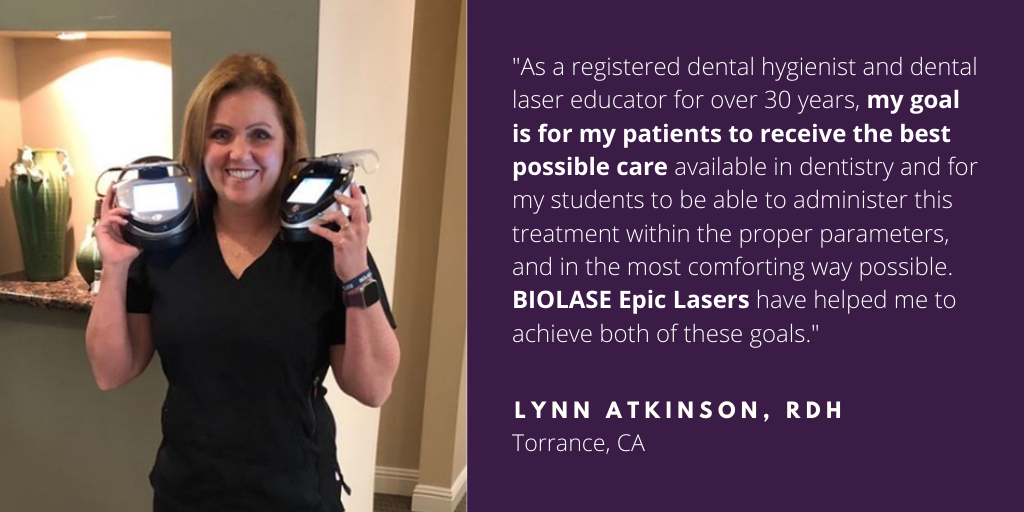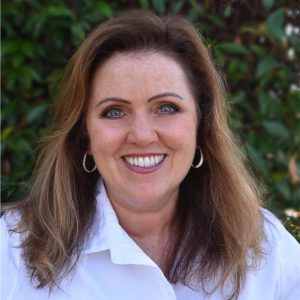clinician spotlight
Bringing Laser Dentistry to Dental Hygienists
By Lynn Atkinson, RDH
In modern dentistry, there are numerous technological advances that help dental professionals deliver the very best care for their patients. Dental lasers are one of the most useful devices that have arrived on the market; and while many new devices that debut are solely geared towards dentists, lasers are utilized by multiple professionals within the industry, including hygienists. Ensuring I provide the latest care for my patients is of great importance to me and my practice. I have been a dental hygienist for 30 years and have been using dental lasers for 24 of those years. I received my certification in laser treatment in 1996, and I have continued to see the positive impact dental lasers have had for so many of my patients over the past two decades.

After graduating from Cypress College with a degree in dental hygiene in 1989, I have been fortunate enough to be a part of several dental teams that incorporated state-of-the-art laser technology. Since my initial training and certification in dental lasers, I continue to apply the use of lasers in hygiene and other treatment areas on a daily basis. Additionally, I have received the Standard Proficiency Certification through the Academy of Laser Dentistry in 2013 and the Advanced Proficiency Certification Parts I and II in 2019.
"The number one benefit BIOLASE diode lasers provide for patient comfort is the ability to treat soft tissues and inflammation."
Contact Us to Learn More
I currently practice clinically four days a week and also speak and train doctors, hygienists and team members on the use of lasers along with strategies to incorporate dental lasers into their protocol. I am very passionate about adopting dental lasers due to the exceptional results that I have seen firsthand. Additionally, I am an active member of the Academy of Laser Dentistry, the American Dental Hygiene Association, and am a Hygiene Member on the BIOLASE Advisory Board.
In clinical practice, we continue to see multiple success stories when we apply lasers to both hygiene and other procedures. Currently, I use the BIOLASE Epic 10, Epic X, and most recently, Epic Hygiene diode lasers. I use the diode lasers for procedures dealing with soft tissue to include laser-assisted periodontal therapy, aphthous ulcer and herpetic lesion treatment, pain therapy, and teeth whitening. With lasers, I can also treat patients’ periodontal conditions with more predictable outcomes and more comfortable healing. This is something that is of high importance to many of the patients that we treat. The diode soft tissue lasers we use help ease patients’ fears about the dentist, as gentler and less invasive options to traditional procedures.
There are some treatments that were not an option for patients prior to the use of lasers. For example, debridement was previously performed with an instrument, usually a scaler, to debride the diseased tissue, unfortunately also removing healthy tissue. The diode laser completely changed the outcome, as it targets the diseased tissue while leaving the healthy tissue unscathed. At the same time, the periodontal procedure is completely comfortable for the patient as it requires minimal anesthesia and possibly just topical anesthetics. Additionally, aphthous ulcers and herpetic lesions treated with lasers reduce the discomfort, severity, and reoccurrence of the lesions. Finally, dental lasers have been a more comfortable and better option for patients needing pain therapy than traditional methods. The more that patients experience dental lasers, the happier they become with their dental treatment which makes my job as a hygienist that much easier and more rewarding.
The number one benefit BIOLASE diode lasers provide for patient comfort is the ability to treat soft tissues and inflammation. There are no contraindications in the use of lasers as long as they are used within the right parameters, allowing me to use the devices for a multitude of different procedures. Because I am able to perform more procedures with the lasers, my patients experience less discomfort during the treatment and require less time to heal.
While lasers have had a large impact on the treatment patients can expect to receive at the dentist, there are even more areas where I believe lasers could be applied. It would be great to see lasers approved and used more often in low-level light therapy or photobiomodulation in the use of oral mucositis, dry mouth, paresthesia, and neuralgia. Patients that undergo head and neck radiation treatment often have painful side effects, especially oral mucositis. Lasers could comfortably treat these side effects to allow more positive results. Education and awareness of the treatment available for these patients is a key component that will help guide decisions to apply lasers in treating these side effects in the future.
One example of a patient success story we recently had was a patient with trigeminal neuralgia who has been in significant discomfort for more than eight years. Through treating the neuralgia with laser sessions of pain therapy, the patient has been able to have more pain-free days than ever before. This is just as exciting for us as it is for the patient, as our utmost goal is to provide comfort for those we treat and to help them return to their everyday lives as pain-free as possible.
As a registered dental hygienist and dental laser educator, my goal is for my patients to receive the best possible care available in dentistry and for my students to be able to administer this treatment within the proper parameters, and in the most comforting way possible. BIOLASE diode dental lasers help me to achieve both of these goals. Patients have better dental experiences with lasers and once dentists and hygienists are properly trained, they have a much easier time utilizing this treatment. Laser treatments are certainly the present and future of dentistry, and as more indications for dental lasers are approved more patients will have the opportunity to experience the advantages lasers have over traditional tools and techniques.

About Lynn Atkinson, RDH
Lynn Atkinson has been a Registered Dental Hygienist for 30 years. She graduated from Cypress College with a degree in Dental Hygiene in 1989 and was fortunate enough to be a part of several dental teams that incorporated state of the art technology. Since her initial training and certification in dental lasers in 1996, Lynn has been actively applying the use of dental lasers in hygiene on a daily basis. Lynn went on to achieve the Standard Proficiency Certification through the Academy of Laser Dentistry in 2013 and the Advanced Proficiency Certification Parts I and II in 2019.
Lynn is currently practicing four days a week and is training doctors, hygienists, and team members on the use of lasers along with strategies to incorporate dental lasers into their protocol. She has a true passion for dental lasers due to the exceptional results that she has observed over the years. Lynn is an active member of the Academy of Laser Dentistry, the American Dental Hygiene Association, and is a Hygiene Member on the Biolase Advisory Board.
Lynn is married with four children in college and lives in Torrance where she was born and raised.
